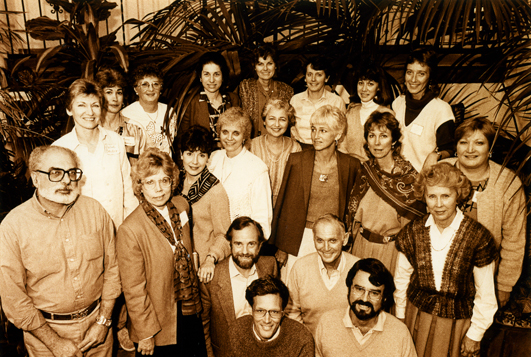Defining Cancer Survivorship
New England Journal of Medicine, July 1985.
Living with, through, and beyond a cancer diagnosis–
In 1986, the founders of NCCS saw a need for language that truly told the story of life after a cancer diagnosis. At the time, there were a growing number of people living beyond their cancer diagnosis and treatment. Many of them were experiencing an array of health issues related to their treatment, as well as late and long-term effects. They also faced psychological, financial, emotional, spiritual, and social challenges. The phrase “cancer survivorship” was created to describe this broad experience on the cancer continuum — living with, through, and beyond a cancer diagnosis.

The founders of the National Coalition for Cancer Survivorship
Defining cancer survivorship was important for the millions of people who shared an experience. It also helped to create a common language for discussing survivorship issues. Our definition of survivorship has been acknowledged by leading authorities such as the Institute of Medicine, the Centers for Disease Control and Prevention and the American Society for Clinical Oncology. The National Cancer Institute’s Office of Cancer Survivorship also accepts this definition, though it focuses its survivorship efforts on the health and life of a person with cancer post-treatment until the end of life.
Before the founding of NCCS, the usual definition of “cancer survivor” was clinical: “someone who had been free of any sign of the disease for five years.” People who weren’t “cancer survivors” were often called “cancer victims.” The act of redefining the term was part of a transformation in how people with cancer talked about their experiences. It provided hope for the newly diagnosed, and empowered patients to be active participants in their care. The founders of NCCS also recognized the impact a diagnosis has on family, friends and caregivers, and later extended this definition to identify them as survivors as well.
Many continue to struggle with how to define “survivor,” or whether to use it at all. We recognize that the term “cancer survivor” may be seen differently by people based on their own experiences. Battlefield and war analogies that one often hears can seem to imply that a person who succumbed to their disease didn’t “fight” hard or long enough to “win” their “battle.” We respect that everyone who is affected by cancer can choose to identify with the term they feel best describes their experience, whether it be “survivor,” “thriver,” “person living with cancer,” any other term that resonates, or even no label at all. The real challenge of cancer is to live as best as one can for as long as one can. The strength one must have to face the unknown every day; the courage one must muster each time they enter a doctor’s office, wait for test results, or receive treatment; and the vulnerability they must endure throughout the cancer journey regardless of the outcome, defines the experience. We at NCCS embrace all individuals affected by cancer, and will continue assuring advocacy for quality cancer care for all.



